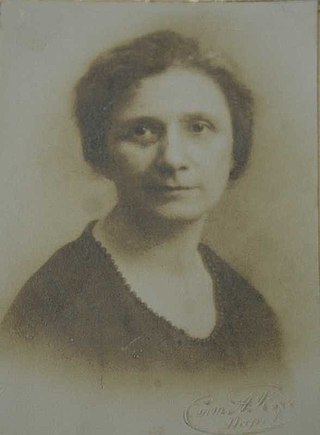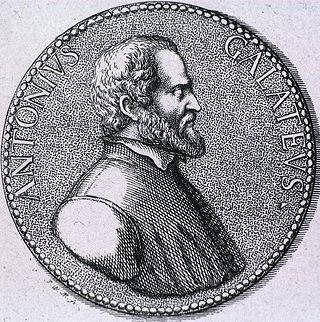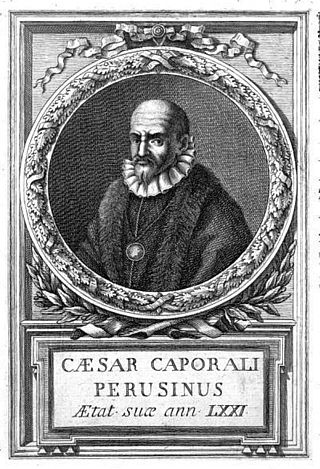
Giovanni Pontano (1426–1503), later known as Giovanni Gioviano, was a humanist and poet from Cerreto di Spoleto, in central Italy. He was the leading figure of the Accademia Pontaniana after the death of Antonio Beccadelli in 1471, and the academy took his name.

Giovan Paolo Parisio (1470–1522), who used the classicised pseudonym Aulo Giano Parrasio or Aulus Janus Parrhasius, was a humanist scholar and grammarian from Cosenza, in Calabria in southern Italy. He was thus sometimes known as "Cosentius". He was a member of the Accademia Pontaniana of Naples, and founded the Accademia Cosentina, an accademia or learned society in Cosenza, in 1511–12.

Antonio Beccadelli (1394–1471), called Il Panormita, was an Italian poet, canon lawyer, scholar, diplomat, and chronicler. He generally wrote in Latin. Born in Palermo, he was the eldest son of the merchant Enrico di Vannino Beccadelli, who had played an active role in Sicilian politics, serving as Praetor of Palermo in 1393.

Vincenzo Cuoco was an Italian writer. He is mainly remembered for his Saggio Storico sulla Rivoluzione Napoletana del 1799. He is considered as one of the precursors of the realist school and Italian liberalism. Cuoco adapted the critique of political rationalism of Edmund Burke and Joseph de Maistre for liberal ends, and has been described as a better historian than either of them. He influenced many subsequent Italian intellectuals, from Ugo Foscolo and Alessandro Manzoni to Bertrando and Silvio Spaventa to Benedetto Croce and Antonio Gramsci.
The Platonic Academy of Florence was an informal discussion group which formed around Marsilio Ficino in the Florentine Renaissance of the fifteenth century.
Pietro Summonte (1463–1526) was an Italian Renaissance humanist of Naples, a member of the learned circle of friends in the Ciceronian manner that constituted Pontano's Accademia Pontaniana. Summonte's care in preserving his correspondence on artistic matters with the Venetian Marcantonio Michiel resulted in a precious archive mined by art historians. His major poem was the Canzone intitulata Aragonia. To him, Jacopo Sannazaro and Benedetto Cariteo addressed verses in Latin and the vernacular, and Sannazaro entrusted his Arcadia, which had circulated in manuscript since about 1485, but of which corrupt pirated editions appeared at Venice (1502) for a carefully corrected printing by Sigismondo Mayr (1504), in which Brian Richardson has detected revisions that brought the language closer to Boccaccio and Petrarch, so that it lost many of its southern dialect forms. Summonte, who took on the guidance of the Accademia Pontaniana after Pontano's death (1503), edited for publication Pontano's two books of Hendecasyllables, to which he applied the subtitle Baiae.

Maria Mikhailovna Bakunina was a Russian-Italian chemist and geologist. Born in Siberia, she moved to southern Italy at a young age, taking up chemistry during her education. By the time of her graduation from the University of Naples, she was already a pioneering figure in stereochemistry and made a number of advancements in applied chemistry. During the early 20th century, she carried out a series of geological surveys in the region of Campania, identifying a number of ichthyol deposits for exploitation. With the outbreak of World War II, she continued her work at the University of Naples and dedicated herself to the rebuilding of the Accademia Pontaniana after the war.

Antonio de Ferraris, also known by his epithet Galateo, was an Italian scholar, academic, doctor and humanist, of Greek descent.
Federico Cafiero was an Italian mathematician known for his contributions in real analysis, measure and integration theory, and in the theory of ordinary differential equations. In particular, generalizing the Vitali convergence theorem, the Fichera convergence theorem and previous results of Vladimir Mikhailovich Dubrovskii, he proved a necessary and sufficient condition for the passage to the limit under the sign of integral: this result is, in some sense, definitive. In the field of ordinary differential equations, he studied existence and uniqueness problems under very general hypotheses for the left member of the given first-order equation, developing an important approximation method and proving a fundamental uniqueness theorem.
Carlo Miranda was an Italian mathematician, working on mathematical analysis, theory of elliptic partial differential equations and complex analysis: he is known for giving the first proof of the Poincaré–Miranda theorem, for Miranda's theorem in complex analysis, and for writing an influential monograph in the theory of elliptic partial differential equations.

Giuseppe Artale was a Sicilian poet, novelist, and duelist, known for his Marinist works. He was also a knight of the Constantinian Order of Saint George.
Vito Carmelo Colamonico (Colamonaco) was an Italian geographer, geologist and scholar. His works include studies on some karst dolines and landforms of Italy, such as Pulo di Altamura, Pulicchio di Gravina and Gurio Lamanna.
Annibale Giuseppe Nicolò Giordano was an Italian-French mathematician and revolutionary.
Antonio Bruni was an Italian Marinist poet. He was one of the most successful of Marino's followers.
Antonio Muscettola, Duke of Spezzano, was a Neapolitan nobleman and writer.

Berardino Rota was an Italian Renaissance humanist and poet.
Girolamo Fontanella was an Italian Baroque poet.
Tommaso Costo was an Italian Renaissance humanist and writer.

Cesare Caporali was an Italian Renaissance poet.

Scipione Capece was an Italian jurist, humanist and poet, professor of Civil Law and president of the Accademia Pontaniana.










